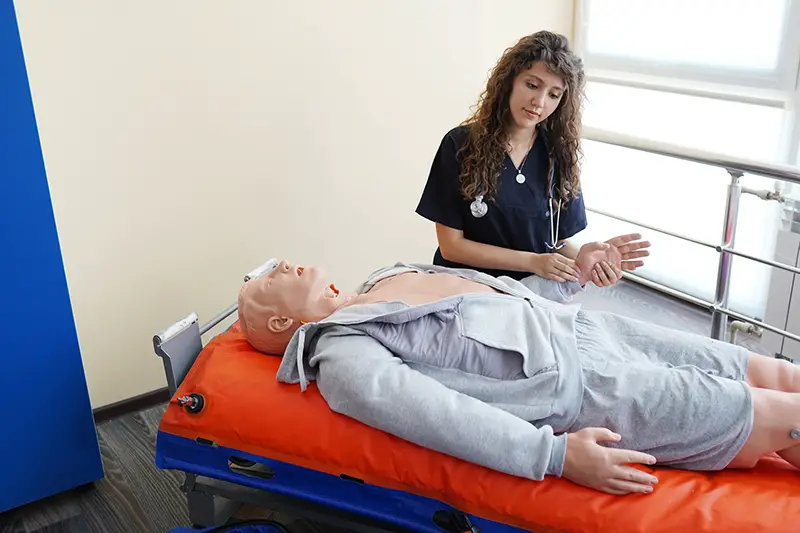Click here to get this post in PDF
First aid can help prevent minor injuries, scrapes, bruises, and more at the workplace. Often, workplaces can be in high-risk environments, where first aiders are crucial for saving people’s lives. The Health and Safety Executive (HSE) First Aid Regulations 1981 makes having first aiders in workplaces mandatory for all businesses. The regulation states that all employers have a legal duty to provide first aid to all employees. This rule is made compulsory to receive immediate attention and first aid in case of injuries or emergencies.
Employers must provide quality first aid training courses to manage emergencies and call for immediate ambulance services. Self-employed people who work with one or two other workers must also demonstrate knowledge of first aid in accordance with the regulations laid out by the HSE.
Since first aid compliance is mandatory for all employers, it is prudent always to have a first aider present at the workplace. However, many businesses do not understand whether their businesses need first aid training.
Risk Assessment:
Before figuring out whether the business needs first aid training, it is necessary to complete a health and safety risk assessment. Depending on the nature of the work, how many employees are in the workplace, and how many visitors come to the office, the risk analysis will differ.
Employers must appoint a person to look after the first aid requirements, the first aid kit, and call upon emergency services in case of an emergency. Employers must also ensure that first aid is covered if the first aider is on leave or is sick.
Employers need to provide the following:
- Adequate number of first aiders present at all times
- First aid kits (bandages, gauze, band-aids, sterilised scissors, medical tape, sanitisers, face masks, rubber gloves, antiseptic creams and lotions, burn treatment pads or gels, eyewash, and so on)
- First aid room or safe area (decontaminated area)
While businesses are not required (by law) to provide first aid to visitors, customers, and members of the public, it is best to stay prepared in case of natural calamities and unavoidable accidents.
Does The Business Need First Aid?
Employers need to decide whether the business needs first aid depending on the risk level after the assessment analysis.
Low-Risk Workplace:
Shops, offices, open spaces, and more are considered low-risk workplaces. Small businesses with 5 – 50 employees will need at least one certified first aider at all times. If the company employs more than 50 people, the business owner will have to ensure one first aider per hundred employees after that. HSE recommends having one first aider per fifty people as a best practice and at least one first aider per floor (depending on the size of the office or workplace).
High-Risk Workplace:
High-risk workplaces face stricter rules than low-risk places. Construction sites and factories are considered high-risk areas. Other areas that come under high risk are mines, health services, and railways. These places also need a First Aid Appointed Person (FAAP) for less than five employees. If you have more than five employees, you would need one first aider per fifty people and a FAAP.
The best practice for first aid is to ensure that there are first aiders and FAAP at all workplaces. Depending on the level of risk assessment, you may need to appoint further first aiders. Usually, it is considered best practice to offer certified first aid courses to all employees. In high-risk workplaces, having more first aiders is always better than having few. Since first aiders are critical for saving lives, there must be more first aiders in high-risk workplaces than those in low-risk workplaces.
What Happens If My Business Does Not Appoint A First Aider?
If the risk assessment indicates a need for a first aider or a FAAP, and the employer does not appoint a first aider, there may be potential repercussions. All employers must ensure there are adequate and appropriate first aid measures for the safety of employees.
- Fines: In case of a health-related incident, the HSE will conduct an inquiry into how the first aid was handled. If the first is found inadequate according to the guidelines, there will be penalties or fines levied.
- Human Cost: If the business has not appointed the first aider, the cost to human life will be far greater than average. For example, first aiders can help with CPR or the Heimlich manoeuvre in case of cardiac arrests or choking, respectively, and help save lives. The human cost of non-compliance may also result in HSE investigations.
You may also like: Why Safety Training Tracking Is Essential for Your Workplace Safety
Image source: Dreamstime.com

